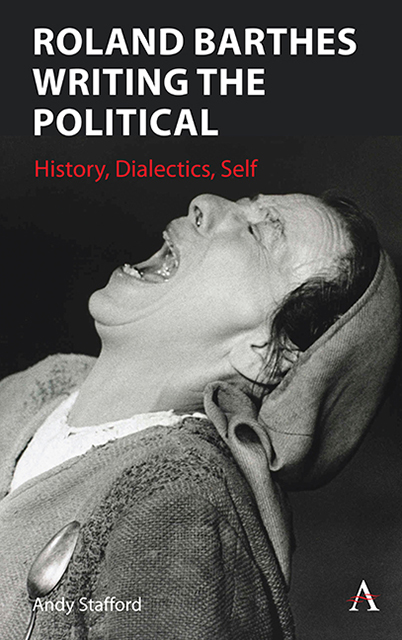Book contents
- Frontmatter
- Contents
- Acknowledgements
- Foreword
- Chapter One ‘The Dialectical Logic of Love’
- Chapter Two ‘Amorous Dialectic’
- Chapter Three ‘The People Chorus’
- Chapter Four ‘Double Grasp’
- Chapter Five ‘Stereographic Space’
- Chapter Six ‘Non-Classifiable’
- Chapter Seven ‘New Dialectic’
- Chapter Eight ‘Opacity’
- Chapter Nine ‘Undialectics’
- Afterword: Essayism and the Politics of Writing
- Bibliography
- Index
Chapter Nine - ‘Undialectics’
Published online by Cambridge University Press: 08 June 2023
- Frontmatter
- Contents
- Acknowledgements
- Foreword
- Chapter One ‘The Dialectical Logic of Love’
- Chapter Two ‘Amorous Dialectic’
- Chapter Three ‘The People Chorus’
- Chapter Four ‘Double Grasp’
- Chapter Five ‘Stereographic Space’
- Chapter Six ‘Non-Classifiable’
- Chapter Seven ‘New Dialectic’
- Chapter Eight ‘Opacity’
- Chapter Nine ‘Undialectics’
- Afterword: Essayism and the Politics of Writing
- Bibliography
- Index
Summary
Politics of Biography
In Chapter One, we considered the merits and appropriateness of looking at Barthes's thought and writing in a backwards, and anti-teleological, fashion. This was part of a concern to present his work in an equalized if not non-hierarchical manner that tried to disallow any privileging of the later ideas in ways that downplayed the political Barthes in favour of the aesthete. In this final chapter, we pursue the de-hierarchization of the aesthetic over the political by considering the political import of inverting History through a consideration of what we might call Barthesian dialectics: or, the ‘undialectical’.
In his biography of himself (1994, 68–69), Barthes uses the figure of the spiral to account for the way in which he sees his thought returning in different forms and in different places along his career. Indeed, the spiral goes to the heart of the Barthesian conception of the dialectic, in all its guises:
The symbolism of the spiral is the opposite of that of the circle; the circle is religious, theological; the spiral, a kind of circle distended to infinity, is dialectical: on the spiral, things recur, but at another level: there is a return in difference, not repetition in identity. […] The spiral governs the dialectic of the old and the new; thanks to it, we need not believe: every-thing has been said, or: nothing has been said, but rather: nothing is first yet everything is new. (1985b, 218–19)
How then does the spiral – alongside the doubles, circles, returns that we have identified in Barthes's work – fit with the ‘undialectical’?
Though Barthes's ‘undialectical’ appeared to be used in some sense negatively in relation to Sartre and Marx's inability to use language dialectically (and thereby get beyond paradox), this turns around in Camera Lucida. Following his mother's death, his own death suddenly appears to him ‘undialectical’; for, since he has no offspring, ‘the only biography is of an unproductive life’, that of a ‘being pour rien’ (1994, 5, 21). In line with the Hegelian dialectic, his own death to come will produce nothing (1984, 71–72). Except that Barthes reverses chronology in the light of this non-dialectical (or anti-dialectical) situation, by considering his recently deceased mother as his daughter, as a product of his own life, and then proceeding to immortalize her by inscribing her into his essay on photography.
- Type
- Chapter
- Information
- Roland Barthes Writing the PoliticalHistory, Dialectics, Self, pp. 195 - 218Publisher: Anthem PressPrint publication year: 2022



